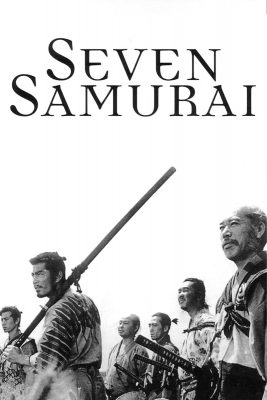
Assembling the Seven Samurai
Several villagers head into town where they find Kambei (Takashi Shimura), a seasoned yet aging rōnin, demonstrating his skill by saving a young boy from a desperate thief. A novice samurai, Katsushirō (Isao Kimura), pleads to become Kambei’s disciple. The villagers appeal for Kambei’s help who, although hesitant at first, agrees. Kambei then recruits his former comrade Shichirōji (Daisuke Katō), and three other samurai – Gorobei (Yoshio Inaba), Heihachi (Minoru Chiaki), and Kyūzō (Seiji Miyaguchi), a quiet master swordsman whom Katsushirō admires. Kikuchiyo (Toshiro Mifune), a lively, eccentric samurai-imposter, is also eventually accepted after failed attempts to keep him away.
The Samurai-Farmer Alliance and Rising Tensions
Upon their arrival at the village, the samurai and farmers start building mutual trust. Katsushirō, despite social class constraints, falls for Shino (Keiko Tsushima), a farmer’s daughter disguised as a boy by her father. The samurai’s relationship with the villagers becomes strained when Kikuchiyo presents armor and weapons retrieved from fallen samurai, revealing the villagers’ darker past. Kikuchiyo retorts that the samurai themselves are a cause of much of the farmers’ suffering, sharing his background as an orphaned farmer’s son, which shifts the samurai’s anger to remorse.
Preparing for Battle
Kambei equips the villagers with bamboo spears and organizes them into units to prepare defenses and provide training. After successfully ambushing three bandit scouts, the location of their camp is revealed. The samurai, in a proactive move, torch the camp. However, this victory is marked by tragedy as a village helper, Rikichi, finds his kidnapped wife choosing death in the flames and Heihachi perishes while preventing Rikichi from pursuing her. Heihachi’s funeral inspires the villagers, thanks to Kikuchiyo who hoists a banner symbolizing their unity.
The Bandit Assault and the Final Stand
Confused by the fortified village, the bandits resort to burning the outskirts, including Gisaku’s mill, resulting in the death of Gisaku’s family except for a baby saved by Kikuchiyo. A battle ensues, with the defenders effectively countering every bandit attack. The bandits, equipped with three muskets, prompt Kyūzō to capture one. Kikuchiyo, envious of Kyūzō’s feat, abandons his post to seize another musket, thereby allowing a few bandits to infiltrate and cause significant damage, including Gorobei’s death.
The Revealed Love Affair and Final Assault
Katsushirō and Shino’s secret affair is exposed, causing outrage within Shino’s family. The villagers and samurai intervene, and Shichirōji convinces them to forgive the young couple due to the pressures of impending battle. The following morning, the defenders ambush the remaining bandits entering the village. The bandit chief manages to kill Kyūzō and fatally wound Kikuchiyo but is killed by Kikuchiyo in return before he succumbs to his injuries. The remaining bandits are also successfully eliminated.
Aftermath of the Battle and The Samurai’s Reflection
Once the battle ends, Kambei, Katsushirō and Shichirōji pay their respects to their fallen comrades, looking over the funeral mounds as the villagers celebrate their victory. Katsushirō and Shino meet once more, but the romance between them is no more. Kambei reflects on their victory, telling Shichirōji: “The victory belongs to those peasants. Not to us.” This serves as a poignant reminder that although the samurai have won, their victory is a pyrrhic one as they have lost so much in the process.
Movie Review
“Seven Samurai” is a 1954 Japanese epic period drama film directed by Akira Kurosawa. Set in 16th-century feudal Japan, the movie follows a village under threat from bandits who hire a group of samurai to defend them. The film explores themes of honor, sacrifice, and the complex dynamics between the samurai and the villagers.
The film is a monumental work of cinema that has had a profound influence on filmmakers worldwide. Its masterful storytelling, captivating performances, and innovative filmmaking techniques have made it a timeless classic and a testament to Kurosawa’s artistic vision.
The film’s visual style, from its sweeping landscapes to its carefully composed shots, is a visual feast that transports the audience to feudal Japan. The use of deep focus, dynamic camera movement, and meticulous framing creates a sense of scale and dynamism, enhancing the narrative and immersing the viewers in the world of the film.
The screenplay, written by Akira Kurosawa, Shinobu Hashimoto, and Hideo Oguni, presents a captivating narrative that balances action, drama, and character development. The film delves into the motivations, conflicts, and personal journeys of the samurai, exploring their individual backstories and the dynamics that emerge within the group. The screenplay expertly weaves together themes of honor, loyalty, and the struggle for survival, creating a rich and multi-layered narrative.
The film explores each of the seven samurai’s individual motivations, skills, and flaws, painting a complex and nuanced picture of these legendary warriors. The performances by the cast bring depth and authenticity to the characters, capturing their inner conflicts and the bonds they form with the villagers.
The film’s musical score, composed by Fumio Hayasaka, adds an additional layer of emotion and intensity to the storytelling. The haunting and evocative score complements the visuals and amplifies the dramatic impact of key scenes, heightening the tension and emotional resonance.